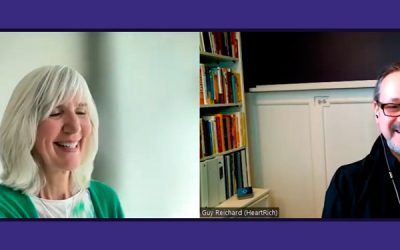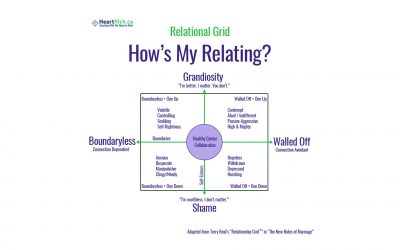On Becoming a Trauma-Informed Coach
It was 2013, and I was in another rut. I had already been coaching for 4 years, after taking the slow and risky leap from running a digital marketing firm to living into my purpose.
I believed what all the hype and platitudes told me, to “do what you love”, “live your passions”, “be the change” and you will not only love your life but you’ll be rewarded greatly for it.
I was doing what I loved and being the change, but somehow, my anxiety was through the roof and ultimately, I fell into a deep depression. Again.
WTF?
At this time, one thing that dulled some of my suffering was my obsessive pursuit of trying to figure out what was really wrong with me. I can see now that that was one of my survival strategies and coping mechanisms – to explore, study and learn obsessively – and I can also see how strongly I held to the belief that I was just fundamentally flawed in some way, wrong, inadequate, invalid.
Was it my absolutely ruthless inner critic?
Was it genetic?
And why so much pain? It wasn’t enough that I suffered emotionally, mentally and spiritually, my body was screaming from within from painful conditions and flareups. Conditions I kept quiet from almost everyone. Hiding, that’s another survival strategy I’m good at (aka ‘masking’).
I wanted to put together a list of all the various troubling and painful issues that burdened me over the years but I’m too embarrassed to share it. I could probably go through the alphabet – allergies, anemia, ankylosing spondylitis, anxiety, asthma – but I’ll stop at the As and spare us both.
While researching, studying and practicing a variety of frameworks, approaches and practices, everything I experienced from anxiety to pain to depression could be explained by one root cause – TRAUMA – but I just didn’t believe it could be true for me until I read these words in 2014:
“Life events can generate at least as many PTSD symptoms as traumatic events.”
Saskia S Mol et al (2005)
It was a lightbulb moment. A momentary floodlight actually but it took me a while to let it sink in.
Could it really be trauma?
It took me several years of study and practice, and eventually therapy to accept that indeed it was. It is.
From everything I’ve learned, and new research is coming out every day, I’m convinced that Trauma, and its constellation of effects, is at the root of nearly every chronic mental, emotional and physical issue plaguing so many of us today. And it goes way beyond that into the fabric of our society.
Trauma is something we ingeniously and tragically can ignore and live with but at an incredible cost. It’s astounding we don’t turn to look at it and heal it because doing so would radically alter how we experience ourselves, others, and life in general – in beneficial and life-enhancing ways.
At it’s core it is something that seems to help us survive through adaptation – a deep learning within that can’t be forgotten – so much deep learning that it can even be passed on intergenerationally.
So, what is Trauma?
There is no single, universally agreed definition of trauma. But its time has come and word is spreading, which means in some circles it’ll be diluted and unfortunately become overused and meaningless but in others, it’ll be transformative and life saving.
Most people tend to think about trauma as an overwhelming event that happens to a person – a violent act against them, abuse, war, an accident, a natural disaster. But trauma isn’t the event – it’s a dynamic and unfolding process that happens within a person that alters them and has far reaching damaging effects – not only in their own lives but in the lives of others they’re connected to.
Let me share a variety of definitions from some of the pioneers I’ve studied:
- Robert Scaer
“Trauma is a perceptual / somatic / emotional experience generated by a complex set of synapses, neurons, and neurochemical states and determined by genes, instinct, and experience, that is capable of developing and directing novel behavior.” - Gabor Mate
“Trauma is a psychic wound that hardens you psychologically that then interferes with your ability to grow and develop. It pains you and now you’re acting out of pain. It induces fear and now you’re acting out of fear. Trauma is not what happens to you, it’s what happens inside you as a result of what happened to you. Trauma is that scarring that makes you less flexible, more rigid, less feeling and more defended.” - Bessel Van Der Kolk
“Trauma is specifically an event that overwhelms the central nervous system, altering the way we process and recall memories. Trauma is not the story of something that happened back then, it’s the current imprint of that pain, horror, and fear living inside people.” - Paul Conti
“Anything that causes emotional or physical pain and leaves its mark on a person as life moves forward.“ It is not true that what doesn’t kill us makes us stronger. The trauma that doesn’t kill us can make us weaker in all sorts of ways. It can predispose us to depression, sleep problems, heart attacks, strokes, immune disease, and we can pass that on to children even if children are conceived years later. And, though it is discussed more often, trauma is not limited to PTSD. The kind of trauma I’m interested in and write about in the book is the trauma that overwhelms our coping mechanisms and leaves us different – our brains different – going forward.” - Francine Shapiro
“Trauma is any past experience that one perceives as negative and that negatively impacts your present life. It creates extreme stress in the body and mind. Traumas can be perceived as horrific, helpless to prevent, and threatening to either your survival or the survival of others or it can be when something happens to you large or small, that leaves you feeling distress and you are unable to process it for some reason. The effects can be long lasting and create distressing symptoms. All trauma manifests in physical and/or sexual and/or psychological symptoms, which can eventually lead to PTSD.” - Hilary Jacobs Hendel
“Big T trauma – a major catastrophic event that affects a person for decades. Small t trauma – caused by repeated, sometimes inconsequential events that build up over time and eventually lead the sufferer to develop symptoms of traumatic stress. We all have some degree of small t trauma, and we all have the capacity to heal from it.” … “trauma leads to false beliefs about ourselves and how abuse and emotional neglect – however small – lead to shame.” “(it) stems from a subjective sense of pain and hurt.” - The Substance Abuse and Mental Health Services Administration (SAMHSA)
“Individual trauma results from an event, series of events, or set of circumstances that is experienced by an individual as physically or emotionally harmful or threatening and that has lasting adverse effects on the individual’s functioning and physical, social, emotional, or spiritual well-being.” “Complex trauma” or “complex psychological trauma” is defined as “resulting from exposure to severe stressors that (1) are repetitive or prolonged, (2) involve harm or abandonment by caregivers or other ostensibly responsible adults, and (3) occur at developmentally vulnerable times in the victims’ life, such as early childhood but can also occur later in life. The concept of historical trauma refers to complex traumatic experiences that affect an entire community or cultural group over multiple generations.”
Big T’s & little t’s
As we can see, some mention a type of overwhelming stressful event as a catalyst, and they call those Big-T Traumas. Others mention certain kinds of hurtful experiences that change us, which they call small-t traumas. An experience or usually a series of experiences over time, and an ongoing alteration of who we are as a result of a survival response somehow incomplete, which now pervades one’s entire life, diminishing wellbeing in all areas of life.
It’s all on a spectrum. From very little alteration in oneself to a complete and painful change in oneself and a consequential disconnect from one’s true self, from one’s essential nature. We lose touch with who we really are and live from our survival parts and our adaptations.
Any number of things, events, and situations can cause those kinds of hurts, and those kinds of changes. From attachment and developmental trauma studies, we learn that more of us need to realize it’s the inappropriately labeled small things that do more harm than we allow ourselves to realize. The things we ourselves deem as too small to have mattered so much. But they did. And many are forgotten or never really stored in memory because we were too young but our survival system is still holding on to it.
We can be quite effective in various parts of our lives but still find ourselves somewhere on the trauma spectrum, with it exerting an influence on our nervous systems and thus our perceptions, experiences and our behaviours. We just think that’s life, and that’s who we are.
It can seem invisible but it’s there, within us, and between us.
What Does Trauma Have to do with Coaching?
As I said above, I believe trauma is a root cause of many of our most common, painful and costly problems – that affects our wellbeing across every conceivable dimension personally, interpersonally and globally. It is self perpetuating and cumulatively damaging. It is now well known and it is still being ignored, preventing health and growth and flourishing.
Without knowing about trauma, we have a high chance of contributing to it or perpetuating it – in ourselves and others – even our coaching clients.
As an individual, and especially as a coach, because I partner with my clients to make a positive difference in their lives, I can’t ignore the knowledge I have accumulated over the past decade – how it affects the whole person (mind, body, emotions, spirit) and one’s whole life.
People come to coaching to help them change and grow – to know what they need and want and to be supported in the growth process that occurs as they move towards, or attempt to move towards, their goals.
I believe it’s fair to say that a portion of people who seek coaching are living with some degree of trauma but don’t know it or understand it as such. They may be seeking solutions to secondary problems – the problems that stem from being locked in to a body/mind carrying trauma, employing outdated survival strategies, adaptations and coping mechanisms that they may actually feel are their greatest strengths. High achieving, overworking, people pleasing, perfection seeking, imposter-concealing, charismatic one moment – aggressive and domineering the next, never feeling good enough, or worthy, or safe.
I believe most coaches, especially highly trained and ethical coaches, are well-intentioned and don’t want to hurt anyone but still, if not trauma-informed, they can actually cause harm to some of their clients – unknowingly, unintentionally.
To many, coaching might serve to perpetuate the client’s own survival strategy – the need to achieve for instance, instead of the needed recovery of their authentic self.
Also, and just as importantly, it could be harmful to a coachee with trauma to proceed with a coach who isn’t sensitive to the grip and influence of trauma, who might also be carrying concealed trauma of their own.
Here is a short list of some of the ways uninformed coaching can harm people carrying trauma:
- Unintentional Shaming
- Toxic Positivity
- Going Too Hard, Too Fast
- Counter-transference
- Judging Survival Strategies & Coping Mechanisms
Trauma-Informed Coaching (preferably Trauma-Wise Coaching)
Trauma informed coaching is not coaching to treat and heal trauma but often it can help initiate and support a natural process to unfold within a person. The return to their natural essence – their Authentic Self and the post-traumatic growth that occurs as a result.
It’s coaching by a person that recognizes the ubiquity of trauma and who does as much as possible to ensure the psycho-physiological safety of their clients. Since for many, it’s the absence of safety within, that causes so much suffering.
Safety? Yes. For many years, I believed I was searching for inner peace and calm but what I really was needing was for my brain and body to believe I was safe. With the sympathetic branch of the nervous system locked in high gear much of the time, and sometimes the parasympathetic branch too, when we freeze, we live from our stress responses.
- Fight (aggression / dominance),
- Flight (avoidance / hiding),
- Freeze (stuckness / powerless),
- Faint (cognitive disruption / dissociation),
- Fawn (please / appease).
Informed and trauma-wise coaches are more sensitive to what’s really driving a person’s agenda (goals for coaching), and instead of being an accomplice, they can be a compassionate messenger and a gentle guide. Being informed is not enough – being wise means we act from our knowledge with virtues like compassion and courage.
“Hey – I see some things in you that look like… can I share a bit about what I think may be behind that?”
Instead of potentially being a trigger and source of additional stress, they can share some of the most valuable capacities they have – their authentic self, their hearts, their presence and their acceptance.
Trauma-wise coaches can help their clients understand themselves better and make sense of their experiences and challenges. They can also help them recognize the signs or symptoms of trauma in themselves and others and inform them of the various healing pathways available to them. This may be supporting them in seeking therapy, if that is truly what they feel ready for.
Coaches, by today’s standards, should not aim to TREAT trauma but they shouldn’t push people away either.
Coaches of tomorrow, in my opinion and in my hopes, should be expected to have learned more psychology, neuroscience, physiology, sociology, pathology, and definitely TRAUMA – and that should include proven supportive protocols that won’t harm and do aim to equip and empower the coachee. As well as empower the coach, and protect the coach from vicarious trauma.
Otherwise – with stress and trauma escalating in the future (the World Health Organization says that stress is an epidemic and we’re experiencing the highest meteoric rise of anxiety and depression ever seen) most people will have some traumatic stress and will want to work with a coach on the many things that can make life rich, meaningful and fulfilling but the coach won’t be fully equipped. The coach training of today isn’t appropriately preparing coaches for the future.
It’s not just coaches who need to become Trauma-Informed, it’s everyone, and you might be surprised to learn that many doctors, therapists, and educators, aren’t informed either.
It’s time we change that.
It’s time we talk about trauma.
===== ====
To help you become more informed today, I want to share a couple of resources.
In most of the books I’ve read that addressed trauma, one person kept coming up, Vincent Felitti as the head of the largest public health study you never heard of. See one of his profound presentations here: https://www.youtube.com/watch?v=gX7bX4ie-qM about the ACEs Study – the Adverse Childhood Experiences Study and the effects of adversity, stress and trauma on our health and wellbeing, individually and collectively.
Finally, one of the trailblazers in the field, Gabor Mate, discusses ACEs, Trauma and the disconnect from Self in this talk: https://www.youtube.com/watch?v=tef5_HK5Zlc. I just received my copy of his latest book: “The Myth of Normal: Trauma, Illness & Healing in a Toxic Culture”, and look forward to learning even more. Interestingly, I just learned that he started writing this book 10 years ago.
Other Books:
- When the Body Says No: The Cost of Hidden Stress by Gabor Mate
- The Body Keeps the Score: Brain, Mind & Body in the Healing of Trauma by Bessel Van Der Kolk
- The Myth of Normal: Trauma, Illness & Healing in a Toxic Culture by Gabor Mate
- The Trauma Spectrum: Hidden Wounds and Human Resiliency by Robert Scaer
- Waking the Tiger: Healing Trauma by Peter Levine
- Getting Past Your Past: Take Control of Your Life with Self-Help Techniques from EMDR Therapy by Francine Shapiro
- It’s Not Always Depression: Working the Change Triangle to Listen to the Body, Discover Core Emotions, and Connect to Your Authentic Self by Hilary Jacobs Hendel
- Complex PTSD: From Surviving to Thriving by Pete Walker
- It Didn’t Start with You: How Inherited Family Trauma Shapes Who We Are and How to End the Cycle by Mark Wolynn







0 Comments